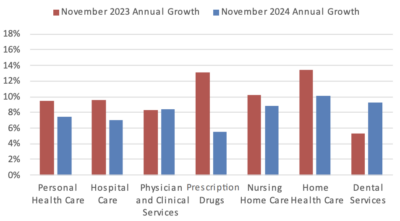The Senior Care Policy Briefing covers important long-term care issues by highlighting policy updates, news reports, and academic research.
Read the full Senior Care Policy Briefing below or download here.
February 14, 2025.
NEWSFLASH
- The Justice Department announced that a multi-state nursing home company and its former CEO pleaded guilty to health care fraud and tax conspiracy related to their operation of multiple facilities in Wisconsin. The scheme allegedly involved diverting Medicare and Medicaid funds meant for resident care to unauthorized uses, failing to meet federal care standards, and neglecting vendor and employee financial obligations.
- In light of these guilty pleas, the NJ Office of the State Comptroller suspended these owners from their operation of the four facilities they own in New Jersey.
- A former operator of a home care services company was sentenced to 12 years in federal prison for orchestrating a $100 million home health care fraud scheme. Newton and her co-conspirators falsified patient records, billed the government for services never provided, and paid kickbacks for patient referrals. Additionally, they hired untrained aides and forged certification documents, jeopardizing patient care.
- An Arizona couple pleaded guilty to conspiracy charges for a $1.2 billion health care fraud scheme targeting seniors in skilled nursing facilities and other healthcare settings. They fraudulently persuaded elderly patients, including those in hospice, to receive unnecessary and expensive wound care, resulting in over $960 million in fraudulent bills to Medicare, TRICARE, and CHAMPVA. They paid kickbacks to sales reps and nurse practitioners to apply costly amniotic wound grafts, some even after patients’ deaths.
The persistence of financial misconduct highlights the need for stronger oversight, accountability, and transparency to ensure that operators uphold their commitments to residents, families, and taxpayers.
GET THE FACTS
- Despite industry claims that nursing homes are financial liabilities, they continue to be seen as attractive investments. For example, the Ensign Group—the second-largest for-profit nursing home chain in the U.S.— recently acquired five Texas facilities and reported that its net income for 2024 was $298 million, an increase of 42.3% over 2023. Research illustrates how nursing home companies, like Ensign, maintain profitability even in challenging times, leveraging real estate and operational “efficiencies” to maximize financial returns.
- A recent study published in JAMA Network found that people with Medicare Advantage (MA) plans are less likely to use home health care at the end of their lives compared to those on traditional Medicare. This disparity was especially true for minority groups, particularly Hispanic and Asian or Pacific Islander descendants, in the MA program, who used even fewer home health services than others.
- This raises important concerns about equitable access to care for vulnerable populations, especially during critical stages of life.

